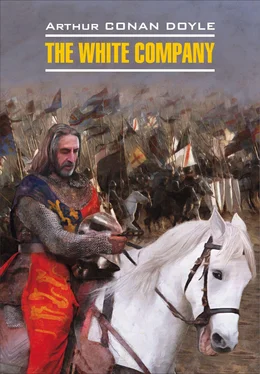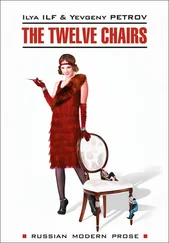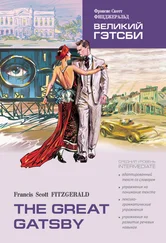Артур Конан Дойл - The White Company / Белый отряд. Книга для чтения на английском языке
Здесь есть возможность читать онлайн «Артур Конан Дойл - The White Company / Белый отряд. Книга для чтения на английском языке» — ознакомительный отрывок электронной книги совершенно бесплатно, а после прочтения отрывка купить полную версию. В некоторых случаях можно слушать аудио, скачать через торрент в формате fb2 и присутствует краткое содержание. Город: Санкт-Петербург, Год выпуска: 2017, ISBN: 2017, Жанр: foreign_language, literature_19, foreign_prose, на английском языке. Описание произведения, (предисловие) а так же отзывы посетителей доступны на портале библиотеки ЛибКат.
- Название:The White Company / Белый отряд. Книга для чтения на английском языке
- Автор:
- Жанр:
- Год:2017
- Город:Санкт-Петербург
- ISBN:978-5-9925-1178-9
- Рейтинг книги:4 / 5. Голосов: 1
-
Избранное:Добавить в избранное
- Отзывы:
-
Ваша оценка:
- 80
- 1
- 2
- 3
- 4
- 5
The White Company / Белый отряд. Книга для чтения на английском языке: краткое содержание, описание и аннотация
Предлагаем к чтению аннотацию, описание, краткое содержание или предисловие (зависит от того, что написал сам автор книги «The White Company / Белый отряд. Книга для чтения на английском языке»). Если вы не нашли необходимую информацию о книге — напишите в комментариях, мы постараемся отыскать её.
The White Company / Белый отряд. Книга для чтения на английском языке — читать онлайн ознакомительный отрывок
Ниже представлен текст книги, разбитый по страницам. Система сохранения места последней прочитанной страницы, позволяет с удобством читать онлайн бесплатно книгу «The White Company / Белый отряд. Книга для чтения на английском языке», без необходимости каждый раз заново искать на чём Вы остановились. Поставьте закладку, и сможете в любой момент перейти на страницу, на которой закончили чтение.
Интервал:
Закладка:
Arthur Conan Doyle / Артур Конан Дойл
The White Company / Белый отряд. Книга для чтения на английском языке
Комментарии и словарь Е. Г. Тигонен
© КАРО, 2017
Chapter I
How the Black Sheep Came Forth from the Fold
The great bell of Beaulieu was ringing. Far away through the forest might be heard its musical clangour and swell. Peat-cutters on Blackdown and fishers upon the Exe heard the distant throbbing rising and falling upon the sultry summer air. It was a common sound in those parts – as common as the chatter of the jays and the booming of the bittern. Yet the fishers and the peasants raised their heads and looked questions at each other, for the Angelus had already gone and Vespers was still far off. Why should the great bell of Beaulieu toll when the shadows were neither short nor long?
All round the Abbey the monks were trooping in. Under the long green-paved avenues of gnarled oaks and of lichened beeches the white-robed brothers gathered to the sound. From the vineyard and the vinepress, from the bouvary or ox-farm, from the marl-pits and salterns, even from the distant iron-works of Sowley and the outlying grange of St. Leonard’s, they had all turned their steps homewards. It had been no sudden call. A swift messenger had the night before sped round to the outlying dependencies of the Abbey, and had left the summons for every monk to be back in the cloisters by the third hour after noontide. So urgent a message had not been issued within the memory of old lay-brother Athanasius, who had cleaned the Abbey knocker since the year after the Battle of Bannockburn [1] the year after the Battle of Bannockburn – битва, в которой шотландцы победили англичан (1314 г.)
.
A stranger who knew nothing either of the Abbey or of its immense resources might have gathered from the appearance of the brothers some conception of the varied duties which they were called upon to perform, and of the busy widespread life which centred in the old monastery. As they swept gravely in by twos and by threes, with bended heads and muttering lips, there were few who did not bear upon them some signs of their daily toil. Here were two with wrists and sleeves all spotted with the ruddy grape juice. There again was a bearded brother with a broad-headed axe and a bundle of faggots upon his shoulders, while beside him walked another with the shears under his arm and the white wool still clinging to his whiter gown. A long straggling troop bore spades and mattocks, while the two rearmost of all staggered along under a huge basket of fresh-caught carp – for the morrow was Friday, and there were fifty platters to be filled and as many sturdy trenchermen behind them. Of all the throng there was scarce one who was not labour-stained and weary, for Abbot Berghersh was a hard man to himself and to others.
Meanwhile, in the broad and lofty chamber set apart for occasions of import, the Abbot himself was pacing impatiently backwards and forwards, with his long white nervous hands clasped in front of him. His thin thought-worn features and sunken haggard cheeks bespoke one who had indeed beaten down that inner foe whom every man must face, but had none the less suffered sorely in the contest. In crushing his passions he had well-nigh crushed himself. Yet, frail as was his person, there gleamed out ever and anon from under his drooping brows a flash of fierce energy, which recalled to men’s minds that he came of a fighting stock, and that even now his twin-brother, Sir Bartholomew Berghersh, was one of the most famous of those stern warriors who had planted the Cross of St. George before the gates of Paris. With lips compressed and clouded brow, he strode up and down the oaken floor, the very genius and impersonation of asceticism, while the great bell still thundered and clanged above his head. At last the uproar died away in three last, measured throbs, and ere their echo had ceased the Abbot struck a small gong which summoned a lay-brother to his presence.
“Have the brethren come?” he asked, in the Anglo-French dialect used in religious houses.
“They are here,” the other answered, with his eyes cast down, and his hands crossed upon his chest.
“All?”
“Two-and-thirty of the seniors and fifteen of the novices, most holy father. Brother Mark of the Spicarium is sore smitten with a fever and could not come. He said that – — ”
“It boots not what he said. Fever or no, he should have come at my call. His spirit must be chastened, as must that of many more in this Abbey. You yourself, brother Francis, have twice raised your voice, so that it hath come to my ears, when the reader in the refectory hath been dealing with the lives of God’s most blessed saints. What hast thou to say?”
The lay-brother stood meek and silent, with his arms still crossed in front of him.
“One thousand Aves [2] Ave – ( лат. ) молитва «Богородице, Дево, радуйся»
and as many Credos [3] Credo – ( лат. ) молитва «Верую»
, said standing with arms outstretched before the shrine of the Virgin, may help thee to remember that the Creator hath given us two ears and but one mouth, as a token that there is twice the work for the one as for the other. Where is the master of the novices?”
“He is without, most holy father.”
“Send him hither.”
The sandalled feet clattered over the wooden floor, and the iron-bound door creaked upon its hinges. In a few moments it opened again to admit a short square monk with a heavy composed face and authoritative manner.
“You have sent for me, holy father?”
“Yes, brother Jerome, I wish that this matter be disposed of with as little scandal as may be; and yet it is needful that the example should be a public one.”
The Abbot spoke in Latin now, as a language which was more fitted by its age and solemnity to convey the thoughts of two high dignitaries of the order.
“It would perchance be best that the novices be not admitted,” suggested the master. “This mention of a woman may turn their minds from their pious meditations to worldly and evil thoughts.”
“Woman! woman!” groaned the Abbot. “Well has the holy Chrysostom termed them radix malorum [4] radix malorum – ( лат. ) корень зла
. From Eve downwards, what good hath come from any of them? Who brings the plaint?”
“It is brother Ambrose.”
“A holy and devout young man.”
“A light and a pattern to every novice.”
“Let the matter be brought to an issue, then, according to our old-time monastic habit. Bid the chancellor and the sub-chancellor lead in the brothers according to age, together with brother John the accused and brother Ambrose the accuser.”
“And the novices?”
“Let them bide in the north alley of the cloisters. Stay!
Bid the sub-chancellor send out to them Thomas the lector to read unto them from the Gesta beati Benedicti [5] Gesta beati Benedicti – ( лат. ) «Деяния блаженного Бенедикта»
. It may save them from foolish and pernicious babbling.”
The Abbot was left to himself once more, and bent his thin grey face over his illuminated breviary. So he remained while the senior monks filed slowly and sedately into the chamber, seating themselves upon the long oaken benches which lined the wall on either side. At the further end, in two high chairs as large as that of the Abbot, though hardly as elaborately carved, sat the master of the novices and the chancellor, the latter a broad and portly priest, with dark mirthful eyes and a thick outgrowth of crisp black hair all round his tonsured head. Between them stood a lean white-faced brother who appeared to be ill at ease, shifting his feet from side to side and tapping his chin nervously with the long parchment roll which he held in his hand. The Abbot, from his point of vantage, looked down on the two long lines of faces, placid and sun-browned for the most part, with the large bovine eyes and unlined features which told of their easy, unchanging existence. Then he turned his eager, fiery gaze upon the pale-faced monk who faced him.
Читать дальшеИнтервал:
Закладка:
Похожие книги на «The White Company / Белый отряд. Книга для чтения на английском языке»
Представляем Вашему вниманию похожие книги на «The White Company / Белый отряд. Книга для чтения на английском языке» списком для выбора. Мы отобрали схожую по названию и смыслу литературу в надежде предоставить читателям больше вариантов отыскать новые, интересные, ещё непрочитанные произведения.
Обсуждение, отзывы о книге «The White Company / Белый отряд. Книга для чтения на английском языке» и просто собственные мнения читателей. Оставьте ваши комментарии, напишите, что Вы думаете о произведении, его смысле или главных героях. Укажите что конкретно понравилось, а что нет, и почему Вы так считаете.












